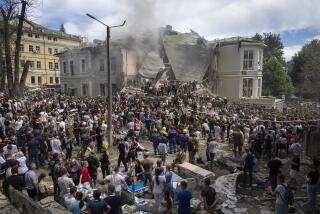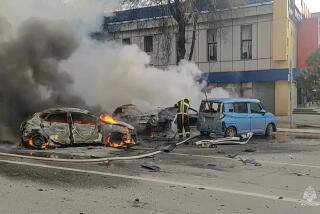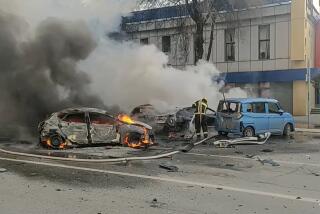NATO Missiles Hit Key Belgrade Ministry Sites
BRUSSELS â The United States and its NATO allies escalated their airstrikes against Yugoslav targets today, for the first time hitting government buildings in downtown Belgrade with cruise missiles in an effort to stop President Slobodan Milosevicâs purge of ethnic Albanians in Kosovo.
The missile attack marked the second day that NATO has gone beyond strictly military targets to destroy civilian buildings and bridges that might be of use to the Yugoslav military. In todayâs raid, the Serbian and Yugoslav interior ministries were hit. On Thursday, U.S. bombers destroyed a bridge in Novi Sad, Yugoslaviaâs second-largest city.
Although U.S. and NATO officials insisted that their air campaign was beginning to wreak heavy damage on the Serbs, the bombings still were relatively sporadic and hampered by bad weather. About half of the planned strikes overnight Thursday were canceled because of weather.
Moreover, officials acknowledged that Serbian forces were rapidly fulfilling their presumed goal of forcing virtually all ethnic Albanians out of Kosovo. NATO spokesmen said that about 634,000 people--one-third of Kosovoâs ethnic Albanian population last March--have been displaced from the separatist Serbian province.
The developments came as the fate of the three U.S. soldiers captured near the Yugoslav-Macedonian border, who reportedly had been slated to face a military tribunal in Kosovo on Friday, continued to be shrouded in mystery, with no sign whether Yugoslavia actually intended to begin any trial.
Pentagon spokesman Kenneth H. Bacon said that despite all-out efforts to learn more about the situation, âwe know precious littleâ about what is going on. U.S. officials said attempts by Swedish diplomats to act in the United Statesâ behalf had been unsuccessful.
Serbian television channels, which had broadcast footage of the three soldiers Thursday, said Friday that the military tribunal had begun a formal investigation, but Yugoslav officials remained tight-lipped. The men were on a reconnaissance patrol when they were captured.
President Clinton reiterated his intention to continue relying on airstrikes without sending ground troops into Kosovo, saying, âI still believe that we have a good possibility of achieving our mission with the means that we have deployed.â
Nevertheless, some well-placed officials suggested that despite the official assertions, the administrationâs policy on sending U.S. ground troops into action was âevolvingâ and could well change depending upon what happens in the field over the next few days.
In other developments Friday:
* The continuing flood of ethnic Albanian refugees from strife-torn Kosovo threatened to overwhelm neighboring countries Friday, prompting the U.S. and its allies to step up humanitarian relief efforts there to cope with the situation.
In an emergency meeting, ambassadors to the 19-country alliance ordered military commanders to make NATO troops in Macedonia available to help provide emergency food, shelter and transportation for the hordes of displaced people in the region.
* News that Milosevic had channeled a request for military aid through the deputy chairman of the lower house of Russiaâs parliament seemed to take top Russian officials by surprise. Russia opposes the airstrikes against Yugoslavia.
Gen. Anatoly V. Kvashnin, the chief of Russiaâs general military staff, who said he learned about the aid request through journalists, said there was no urgent need for immediate military assistance because the Yugoslav army was handling the situation well. âIt should be made clear what kind of assistance is meant here,â Kvashnin said, adding that Yugoslavia might be seeking aid, personnel or equipment.
* U.S. officials said they were unable to determine whether Ibrahim Rugova, a prominent ethnic Albanian activist who was televised Thursday signing a joint statement with Milosevic, was acting voluntarily or under duress.
State Department spokesman James P. Rubin told reporters that Rugova still had not responded to an invitation to confer with U.S. diplomats. Some Western analysts have speculated that Milosevic may be trying to cut a deal with Rugova to end the fighting between ethnic Serbs and Albanians in Kosovo on terms that would be favorable to Yugoslavia. But officials were unable to provide any confirmation.
* In an effort to bolster resolve among U.S. allies and Kosovoâs neighbors, the State Department dispatched a high-level delegation headed by Deputy Secretary of State Strobe Talbott on a six-country tour to discuss political and humanitarian issues.
The group will visit Albania, Macedonia, Greece, Bulgaria and Romania, with a stop in Brussels to confer with NATO leaders. Officials said Talbott will assure them that Washington will help provide security and humanitarian aid for the foreseeable future.
* The administration continued to be concerned that Milosevic may be planning to tighten control over Montenegro, which together with the larger republic of Serbia forms the rump Yugoslavia. Milosevic has fired a slew of Yugoslav generals deemed too sympathetic to Montenegro.
Rubin repeated a warning the administration issued Thursday that any attempt to overthrow the democratically elected government of Montenegro âwould only . . . lead to deeper isolation for Yugoslavia and escalate the conflict with NATO.â
The results of the overnight bombing in Belgrade--fierce blazes pouring from two government ministry buildings--were shown in vivid images on Serbian television. Witnesses reported that the fires covered a huge area in the central city.
The strikes took place shortly after 1 a.m. today Belgrade time--3 p.m. Friday PST--and the blaze continued in full force for several hours. U.S. officials said NATO also was planning other bombing raids outside Belgrade before daybreak.
U.S. officials said seven Tomahawk cruise missiles were launched in the raid, all from two U.S. warships. They said the missiles struck the Serbian and Yugoslav interior ministries--the headquarters of the Serbian military forces that have been conducting the âethnic cleansingâ in Kosovo.
Military analysts said that despite the key role played by the two ministries--which also function as command-and-control centers for Serbian forces--todayâs cruise-missile attack was partly symbolic and would be unlikely to have any direct impact on Serbian forces in the field.
Even so, American strategists said the strike was a demonstration of what NATO commander Gen. Wesley Clark meant Thursday when he warned that Milosevic now would have âno sanctuaryâ from allied bombings.
Since the bombardment began, massive numbers of Kosovo Albanians have been forced from their homes by Serbian forces. Western officials fear that unless they move quickly to aid the refugees, the tide will overwhelm Kosovoâs neighbors--especially Macedonia, Albania and Montenegro--leading to widespread instability and possibly even civil unrest.
In Brussels, NATO spokesman Jamie Shea said the influx had reached such proportions that the allies âare no longer facing an internal Yugoslav crisis--we are facing a crisis of the entire region, with far-reaching consequences.â
In Washington, Clinton ordered the Pentagon to provide transportation and shelter for an intensified humanitarian relief effort, calling leaders of U.S. charitable organizations to the White House to pledge whatever help is needed.
Julia Taft, assistant secretary of State for refugee affairs, told reporters that the herding of ethnic Albanians onto trains to send them out of their homeland was âlike a pogrom.â
The outpouring of ethnic Albanian refugees continued in force Friday, overwhelming international aid workers, who were plainly unprepared to cope with such throngs. Most of the refugees passing through the Macedonian town of Blace had to spend a night at the Yugoslav border awaiting processing.
U.S. officials said NATO countries had been late in launching their humanitarian relief effort because they thought they could deal with whatever situation might develop and ended up underestimating the refugee flow.
International aid organizations had stored enough food in the region to feed 100,000 people for several weeks.
British Air Commodore David Wilby, NATOâs chief military spokesman, said Serbian forces already have pushed ethnic Albanians out of a huge triangle in the center of the province stretching from the cities of Pristina, Pec and Prizren.
He said Milosevic was now trying to drive huge numbers of refugees south and west âto destabilize neighboring countries such as Albania and Macedonia.â
Meanwhile, the Clinton administration appeared to be moving toward backing a plan under which the allies eventually would make Kosovo a NATO-administered protectorate rather than keeping it a part of Yugoslavia once Serbian forces are pushed back.
The State Departmentâs Rubin said that by continuing its âethnic cleansingâ policies in Kosovo, âSerbia is losing its claims to Kosovoâ and âit is harder to see a situationâ in which ethnic Albanians would accept Serbian rule in any peace accord.
Rubin said Swedish diplomats in Yugoslavia, whom Washington has asked to look into the affair, have been unable to obtain access to the captured American soldiers--Andrew A. Ramirez, Christopher J. Stone and Steven M. Gonzales.
In Schweinfurt, Germany, where the three soldiers were based, worshipers in the local German community took a moment in their Good Friday service to reflect on the plight of their missing neighbors.
At the Megadrome nightclub in the town, GIs declined comment on the events in Kosovo. One soldier who didnât want to be identified, said: âWhat can I say? This is our job that needs to be done. Of course, we are not happy about the things going on down there.â
*
Dahlburg reported from Brussels and Pine from Washington. Times staff writers Elizabeth Shogren in Blace, Macedonia, Robyn Dixon in Moscow and Paul Richter and James Gerstenzang in Washington, and researcher Christian Retzlaff in Schweinfurt, Germany, contributed to this report.
(BEGIN TEXT OF INFOBOX / INFOGRAPHIC)
Targets in Kosovo
NATO forces continue to target Serbian army positions in Kosovo, including barracks and training areas, as refugees continue to be shipped out on rail or to flee across the mountains into Macedonia, Albania and Montenegro.
Note: Refugee numbers are since bombing began. Total for Montenegro is down from earlier estimates.
Sources: NATO, AP and Office of the U.N. High Commissioner for Refugees
More on Crisis
* STRANDED--More than 3,000 U.S. civilians are still in Yugoslavia.A8
* WEATHER PROBLEMS--Overcast skies have been a NATO enemy.A9
* HACKING ATTACKS--Kosovo conflict has spread to Internet.A10
* AWAITING NEWS--Tension grows for soldiers at Ft. Bragg, N.C.A10
* COUP FEARS--NATO warns against Montenegro takeover.A11
More to Read
Sign up for Essential California
The most important California stories and recommendations in your inbox every morning.
You may occasionally receive promotional content from the Los Angeles Times.










